The Dreaded Canoe
Pokhara, Nepal
This is an excerpt from a larger list, where I give various activities a Sober Fun rating of 1-10. Entries from this list are scattered throughout my website, or you can find that complete list HERE.
However, The Dreaded Canoe is special, since this is where it all begins; and perhaps, so should you. Get ready to learn about a lot more than just canoeing, because I am going to start at the beginning. I am going to explain in detail what it is like to travel as an alcoholic and drug addict, and that, of course, means we are going to need to start at The Airport.
The photo you see above has almost nothing to do with any of this, I took it years later, sober, in Nepal. So why is it here then? Ah. That would be because all but a pitiful few of the photos that I took on the fateful, drunken, canoe trip in the story I'm about to tell are at the bottom of a Canadian river, along with my iPhone, wallet, and keys.
Oh. And a half-drank bottle of whiskey.
Enjoy!
***************************
CANOEING: 8
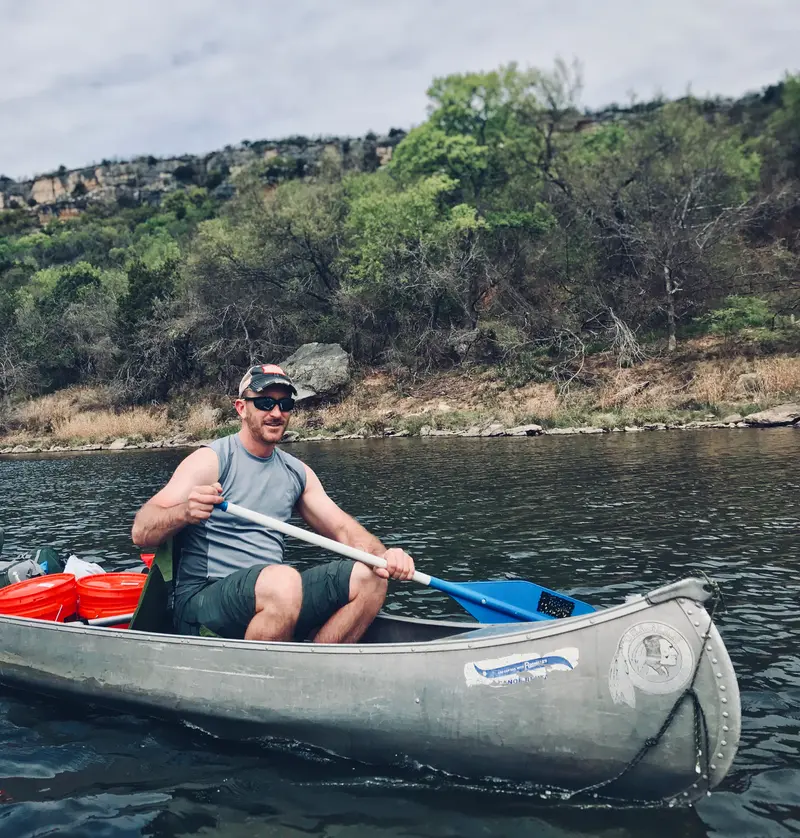
I had an older gay friend of mine once tell me that in his experience, most people he encountered seemed to assume that a person is straight by default, unless they are specifically shown evidence to the contrary. I believe this to be true.
When you don't dress flamboyantly and have mannerisms that mostly conform to traditional ideals of masculinity, you have to all but French kiss a dude in front of some people before they can really comprehend what's going on. Once, even after witnessing me and my boyfriend share a small but intimate kiss, I had a lady in an airport tell me she just assumed we were brothers. Huh. (That makes even less sense, ma’am...)
The takeaway here is that in America you are presumed innocent until proven guilty; or rather, straight until proven gay.
I also believe the same goes with alcoholism. I have found that unless you give a person reason to believe you are intoxicated, they are going to assume that you are sober. Like they are.
Unless you are behaving heinously in public or providing context clues for them (like being seen exiting a bar or a liquor store before noon) then how are they supposed to know that you've secretly been drinking since you woke up?
Inversely, when I was drinking, I honestly believed that most people I encountered were probably drinking too, and just hiding it like I was. I want to go on record here and state that since becoming sober, I have since realized that this is not at all the case. If everyone was actually drinking the way I thought they were (or the way I was), our society would cease to function, possibly even cease to exist. The Washington Post recently reported that just 10% of the American population is responsible for consuming over 60% of all alcohol sold.
Did you know this? Wow. Think about that for a second. I have, and huh. I guess I was in the top 10%.
How fancy of me!
This reporting of course sparks other lines of thinking within my brain, like how the alcohol industry must be well aware of this fact. They must be aware that they get the lion's share of their profits from people who are sick with addiction and need help, and then they knowingly take advantage of this situation. The alcohol disparity also makes me wonder about other lopsided statistics, like what percentage of the world's food supply does America consume? I ponder this in greater detail HERE.
Back on track, Ryan, weren't you were going to talk about a canoe?
Right! Right.
But before we drunkenly hop in that canoe, first we need to get to Canada, and so I want to stop for a second to shed some light on what it's like for an alcoholic to travel. I am willing to bet it's a tad different from what you might expect.
Many people associate traveling with going on vacation. Whether it happens once or several times a year, traveling often represents a time to relax and unwind, and for these "normal" people, this might be an occasion for them to drink a little more alcohol than the normally would. Maybe they even allow themselves to overindulge a little bit, God forbid.
Perhaps they are Heavy Drinkers and have even designed their entire vacation around drinking and being drunk the entire time. I bet this last scenario is more in line with what you pictured when I said I was going to talk about traveling as an alcoholic, and you'd be mostly right, for all but the most drastic of cases.
I was amongst the most drastic of cases.
For me, traveling was the exact opposite: the ideal goal was always to try and stop drinking entirely before the departure date of a trip rolled around, and go through withrawls here, in America, and in the safety and comfort of my own home.
When you hear about "functioning alcoholics," please understand that a lot of that ability to "function" is heavily dependent on established routines, and proven ways to drink secretly and continuously, day after day. But above all else, it presupposes an unlimited supply of liquor, and uninterrupted access to that liquor. Traveling, more than any one thing I can think of in life (other than perhaps incarceration) threatens that routine, and it does so primarily by disrupting an alcoholic's unlimited access to the liquid on which they are dependent.
I purposefully used the word liquid here, because right out of the gate, the airport gate, liquids are going to be a problem. You can't go through airport security with a whiskey flask on your person, nor can you bring bottles of liquor in your carryon. So in one singular instant, your personal supply of liquor has been reduced to zero. For an alcoholic, this is a terrifying feeling, and something you would never allow to happen in your daily "functioning" life. I am feeling traumatized all over again, just thinking about how stressful it was trying to pull this off each and every time I went on a trip.
In my daily life, I was well prepared and always had backup liquor on hand. I had it hidden in a wide variety of easily accessible places -- from my home, to my car, to my office -- all in case an emergency need should arise. It sounds a bit bonkers, perhaps a bit trashy, but it is actually what kept me from looking crazy or blatantly alcoholic to the average, unsuspecting person. It's what kept me from exhibiting many of the tell-tale signs I mentioned earlier, like being seen at a bar or a liquor store at an inappropriate hour (like 7:00 a.m.), that might give the impression of unchecked alcoholism. Stripping me of my personal supply, airport security is like a great leveler: now I'm right there with all the other alcoholics and will eventually need to find a bar or a liquor store and publicly buy or consume liquor, regardless of the hour.
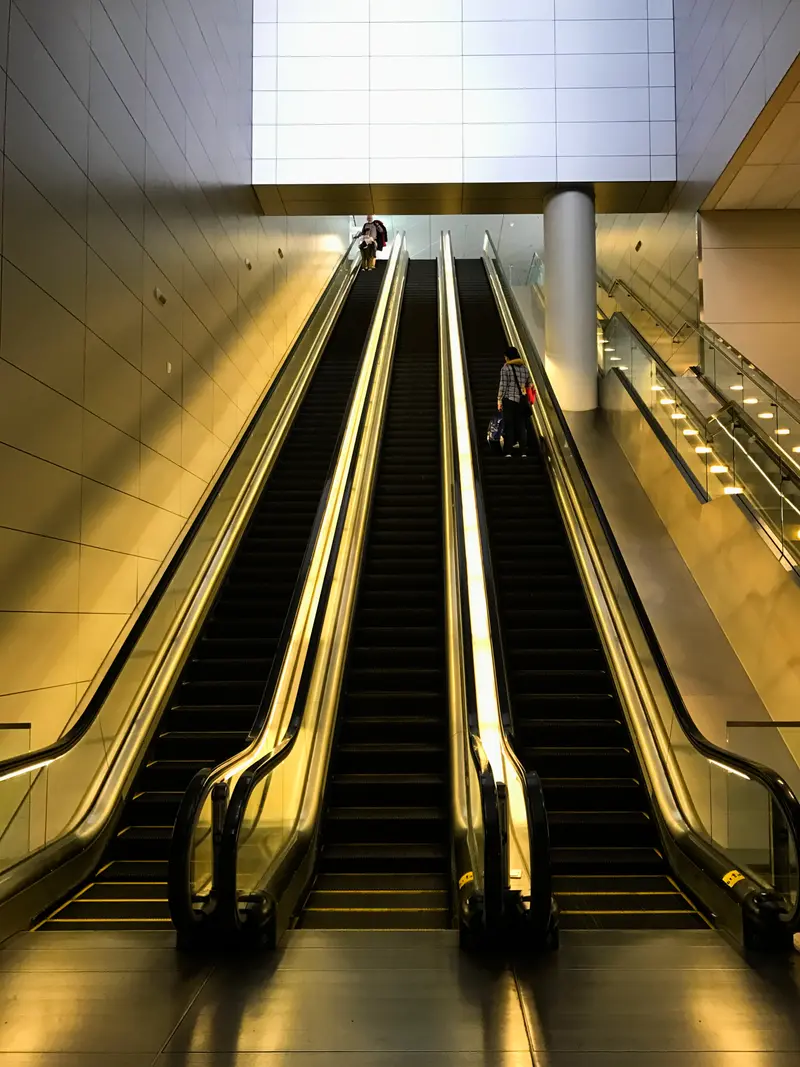
The airport, especially an international terminal, is a very forgiving place for an alcoholic, because no one can be quite sure what time zone you came from, or what time of day it is for you "really," so a 7:00 a.m. cocktail doesn't raise too many eyebrows. It's 5 o’clock somewhere, right? Plus, if all else fails, there's always that undercurrent of a vacation mentality at airports, and no one knows you or what your situation is, nor do they care.
However, that doesn't take onto account the people you might be traveling with. They have eyebrows too, and unless you travel exclusively with other drug addicts and alcoholics, they are not going to understand why you always have to immediately seek out a restaurant or duty-free shop the second you get through security. You can only use the excuse that "airports and traveling stresses you out" so many times to explain urgent and sporadic drinking at inappropriate times of the day.
Also, the "savings" are so marginal, that anyone who really knows me, personally, would immediately call bullshit if -- all of a sudden -- I started uncharacteristically claiming that this tiny omission of sales tax warranted an impromptu shopping spree, and the subsequent absurdity of adding an abundance of heavy clanking bottles to my already weighty backpack.
Suddenly, secret drinking has just become a whole lot more difficult, and we haven't even left Dallas.
The airport restaurant/bar option is always a worst-case scenario, a last resort. At a restaurant, everyone you are with will be aware of how many drinks you are ordering and with what frequency, not to mention, whether it's currently an appropriate time of day. Plus, only with great difficulty can you transfer drinks you bought from the bar into some sort of vessel you can take with you. Because remember, all you Non Alcoholics, getting drunk at the airport was never the point. You need to replenish your personal stash, to avoid a serious situation later down the road (withrawls will roughly start in T-minus 8 hours... the clock is ticking!) so a duty-free store is always the endgame. You are in survival mode, preparing for the future. You need personal alcohol that you can control, and control in secret, and this means that not only do you need to find the duty-free store, ideally you need to find it, or at least make your purchases, alone.
Trying to disguise the fact that you bought any liquor at all in the airport is a fool's errand, so don't waste your time attempting to hide that part of your alcoholism. Your travel companions might want to come with you to duty-free, or pass by and see you standing in line, or spot the liquor in your backpack, and if so, maybe even ask you to bust it out later on in the trip, etcetera. If you no longer have it, well, where did it go? There are just too many possible ways that trying to keep your errand to the duty-free store a secret could backfire. No, the errand is public, it's just what you purchase there (and the exact amount) that you want to keep hazy.
Any seasoned alcoholic knows that you always keep two stashes, one that is for public view and public consumption, and the other that is for your personal, private, and usually secret usage. This means you always have to buy a few "dummy" bottles. These are bottles that you are readily willing to pass around and share with group, and these bottles should maintain liquor levels that correspond with what the group thinks is happening, alcohol consumption-wise.
I'll be totally honest, sometimes I never even touched the liquor in these dummy bottles, they were purely for show, and for other people to consume if they asked. Of course, sometimes you aren't able to restock your liquor supply at the airport. Let's say your flight is late and the connection airport, where you had planned to purchase your liquor, becomes a frantic sprint to catch the next plane. This then brings us to the much less desirable Plan B.
Plan B is re-upping your personal liquor supply in your destination country, and it is a less desirable option for many, many, reasons.
1. First, the liquor laws of the destination country could be problematic. Keeping track of the Blue Laws and liquor store hours in Texas is confusing enough, now imagine throwing in a bunch of country-specific customs and traditions, maybe even a holiday or two that you weren't even aware existed --not until you showed up to find the liquor stores inexplicably closed! No matter how much research you do beforehand, you will invariably encounter surprises, and so depending on liquor stores in a foreign country is risky, at best.
2. Secondly, even if it is a liberal country insofar as the sale of alcohol is concerned, what if you simply arrive late in the day, too late to make it to a liquor store before they close?
3. To go to a liquor store, especially if it's on the other side of town, you will probably have to involve the whole group, which is never ideal. They will likely see the confounding cornucopia of bottles that you will be purchasing.
4. What if the group doesn't even want to go, or wants to "wait until tomorrow"? They don't understand your urgency, that you are about to get sick if this isn't solved, and so then you have to look like the hardcore alcoholic that you are, by doing something completely crazy, like racing in a taxi across town, or even jogging there, all to arrive at the liquor store with just 5 minutes to "shop" before they close.
If you think all of this sounds stressful, well... it is. Very. I want to again stress the part where I'm about to get sick if I don't replenish my alcohol supply, and also return to what I said to begin with, that with the proper amount of foresight and planning, the ideal path for me when traveling internationally was always to stop drinking ahead of time, so that I could go through withdrawls in my own home. Alone.
Otherwise, I would have to waste several days of a trip, holed up God knows where, sick as a dog, probably in some nice hotel, but also still in some other country, with foreign medicines I don't know or recognize. Also, with everyone in my travel group possibly aware of what is going on. I am feeling traumatized all over again, just thinking about how stressful it was trying to pull this off each and every time I went on a trip. If you can't already guess, traveling for me was the exact opposite of a nice and relaxing vacation, specifically the preparation.
I will now attempt to break down the preparation involved, leading up to the departure date of a lengthy or international trip:
1. The first step was always to try and stop the cocaine use well in advance of any trip. Without doing this, I could never expect to stop the drinking, as alcohol is an integral part of the coming down process, and being able to eventually go to sleep when you crash, instead of trying to find more cocaine.
2. So now that I've stopped the coke, I am going to need about three consecutive days, alone, mostly in bed or on the couch, to stop drinking.
3. If you drank the night before, then on Day #1 of No Drinking, the goal is just to not drink any alcohol when you wake up. Without the alcohol to keep you fueled and going, on day #1 you will probably be able to sleep a bit, off and on. What many people don't understand, is that for some alcoholics, the alcohol acts almost as a stimulant, it gives you energy and fuel to attack the day. When you first take it away, your body will catch up on much needed sleep. This is all difficult, but nowhere near as hard as Day #2
4. Day #2 is a totally different story. Or, more accurately for me, it usually started in the late night/wee morning hours of Day #1. You can say goodbye to any more sleep. The cold sweats and spinning will start, sometimes also with dry-heaving and almost always the shakes. Some people call them tremors, or "DTs," but this is where you can't even move a fork to your mouth without someone commenting on how shaky you are. But the good news is, you won't be able to eat on day #2 anyways, so need to even bother with that fork. Your body will reject all food. It wants alcohol! Not food, you idiot! What are you giving me?!? Blehhhhhhhhhhhhhhhhh. That's my body retching and rejecting any and all solid food.
Are you starting to get why I want to do this alone in the forgiveness and seclusion of my own home, and not in a hotel in another country?
5. Day #3 is another miserable day, mostly of headaches and fever dreams. This is when you can start taking fever and pain medications like Advil and Tylenol and will probably be able to actually keep them down. Your body might even start letting you sleep again, but don't count on it. This is also the day where you need to start trying to reintroduce food again. You will be very weak and will need to start eating food of some sort, if you are going to accumulate enough energy to rejoin society.
6. And again, you really want to be at home for this. It is absolutely awful to be in a foreign place where you can't get food you are used to and that won't upset your stomach. Imagine that you are incredibly sick, and people just keep bringing you slimy things or f*cked up curry dishes of goat or something. (Damn it! I suspected you probably wouldn't be able to find the pop tart I requested, but how did you decide that menudo soup made from tripe was a comparable substitution? Flush it down the toilet please, I can't even handle smelling it!)
7. If your body still won't accept food on day #3, then you will have no choice but to drag this out another day. That's why my advice is to always give yourself an extra day of leeway, whenever possible, just in case.
Every person is different. Sadly, I did this enough to know that personally, I can do it in exactly three days, and be back to the gym on the morning of the forth. Also sadly, before we left for Canada, I was unable to complete any of these preparatory steps. Our departure date essentially corresponded with... well, a day that's not even on this list, let's call it A Day #0, and perhaps you can guess what that meant.
If not, I'll spell it out for you: Both crack cocaine and alcohol were being consumed until mere minutes before the car showed up to take us to the airport. Now. For any trip where sobering up beforehand was impossible, or for whatever reason simply did not happen, then I had just two choices for how to proceed:
1. Show up to wherever you will be staying in whatever country you are in, armed with as much over-the-counter cold and flu and headache medication as you can find, and waste the first three days of your trip locked in your room, doing what you should have done at home before you left.
2. Keep drinking. For the duration of the trip.
For Canada, we were never staying in one place for longer than two nights, most places only one, and there was a shit ton of travel planned by car. Being sick whilst on the move and having withdrawals in a car? Nah, I’ll pass on that! By a landslide, the second option won the day, which is why I have few memories and even fewer pictures of central Canada.
I am again having difficulty writing this in such a way as to not implicate other people in the story who were also struggling with addiction at the time, and for all I know, may still be; so let's just say that my ex-partner Jeff was also aware of the situation. And while we almost never attempted to locate cocaine in other countries, this was only Canada after all, and so with minimal effort, we were easily able to find liquor for everyone, almost immediately.
Where we didn't see eye to eye, however, was on whether it was prudent to bring liquor with us on the canoe.
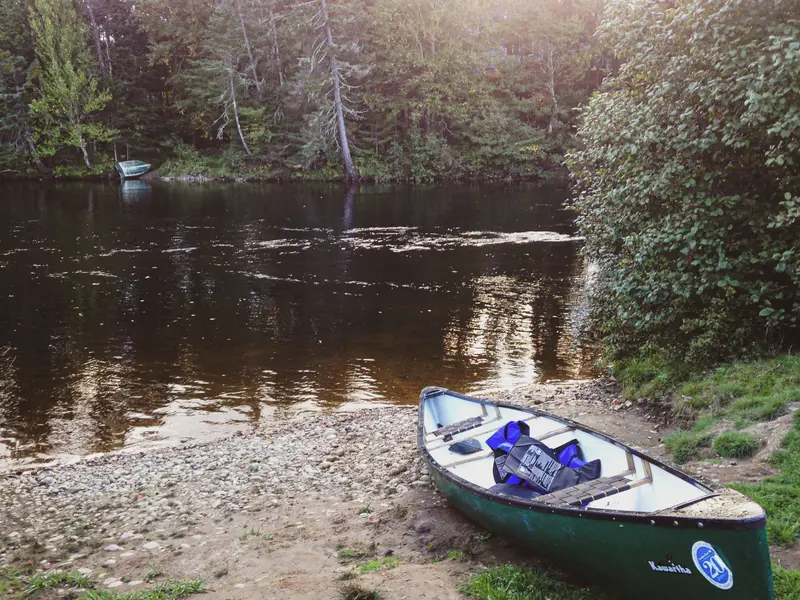
We are so close to getting into the canoe that I promised you, and yet, I want to again pause here to share with you something that I've realized. After getting sober, I still enjoy many of the same activities I did when I was drinking, but I have realized I enjoy them for MUCH SMALLER INTERVALS OF TIME.
There are sooooo many activities that -- once you take away the alcohol -- need to be decreased by about half. Without constant nips of whiskey, it becomes apparent that many of these activities are boring and redundant, if not downright punishing. Especially when they are allowed to consume the better part of a day. Others, it turns out, are still just as fun as ever. I have taken the time to compose a lovely reference list HERE for you, and I truly do hope it proves useful when planning your next adventure.
But first, I promised you a canoe, and here it is. On that fateful day, I had also promised Jeff that I wouldn't start out the day with whiskey, and yet... there we were.
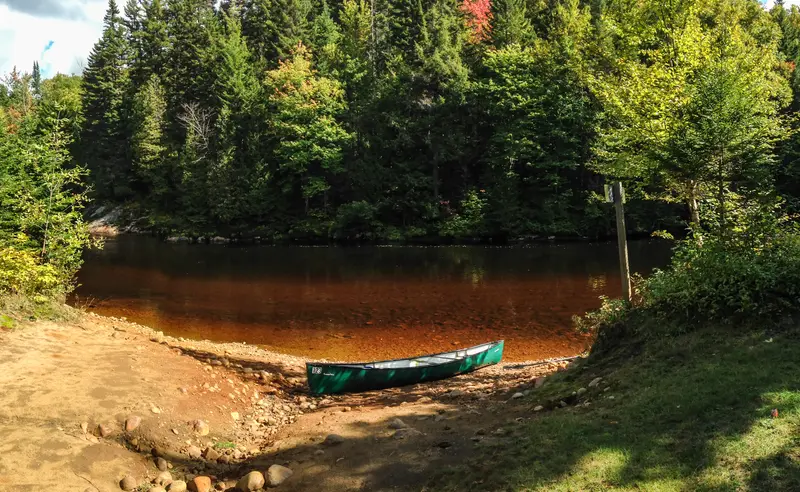
Finally, The Canoe
It is hard not to view me and Jeff in this canoe as anything other than a metaphor for our relationship as a whole, so I’m not even going to try to resist. It was a canoe of good intentions and broken promises, an upstream struggle from start to finish, and it ultimately ended badly for both of us.
Canoeing demands synchronicity and teamwork, and when two people can never fully get it together and fall in sync, you are going to waste a lot of time going in circles. And wow. When you are working against each other, it is amazing how much energy and effort it can take to go absolutely nowhere! If viewed from afar, Jeff and I probably looked like we were stuck in some kind of whirlpool, as we twirled aimlessly about, bounding clumsily down the river and narrowly avoiding self-induced crisis after self-induced crisis.
Our inability to work together eventually ended up with an overturned canoe, both of us in the freezing cold water (fully clothed) and clamoring to survive. I am going to use an analogy here that I have used many times, especially when I hear about two addicts in a relationship that think they are going to get sober together, as a couple.
When two people are drowning, and can barely keep themselves afloat, what is the likelihood that they are in any position to save each other? No matter how much you might love that other person, if you can barely keep your own head above water, isn’t it much more likely that you will end up dragging that other person down with you? Rather than saving them, won’t you more likely just make things worse? On an airplane, they always tell parents to put their own oxygen mask on first, before trying to help their children. Because if you are gasping for air yourself, how much help can you really be to another person?
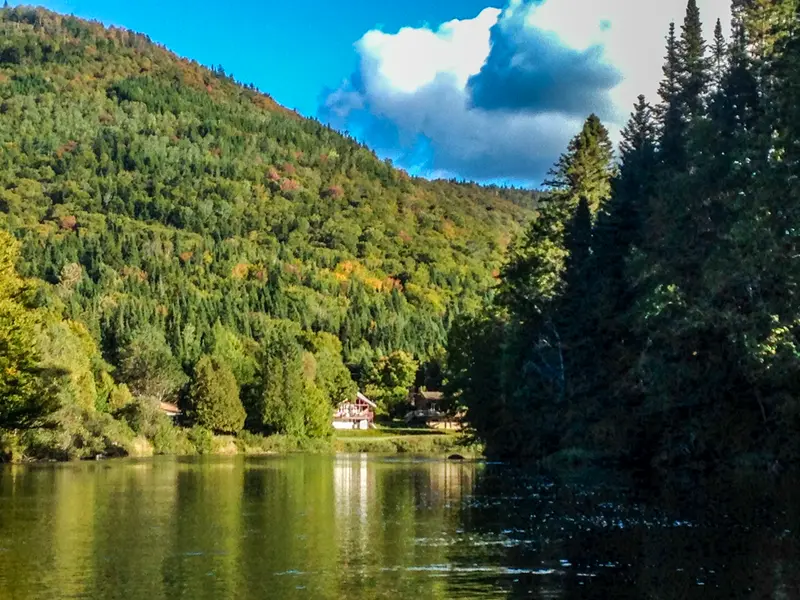
My wallet, whiskey, phone, and keys all ended up at the bottom of that river, never to be recovered. Jeff and I survived— physically, at least— but on that fateful day, I believe that a great many more things were lost between us, intangible things that turned out to be just as irretrievable.
Once we overturned, and it became apparent that Jeff and I had no business being in a canoe together, wouldn’t it be great if we could just call it quits and be done with the canoe right then and there? Just get out and walk away? But alas, no, just like our relationship, things would have to get a lot worse before they could get better. Wearing our drenched winter jackets and sopping wet from the top of our freezing heads all the way down to our squishy hiking booted toes, we were both bedraggled and exhausted and blaming the other person for all that had happened. And yet, we were stranded. We had no choice, we still had to get back in that canoe and somehow pull it together enough to paddle down that Canadian river for another four years. I mean hours. Another four hours, in the canoe.
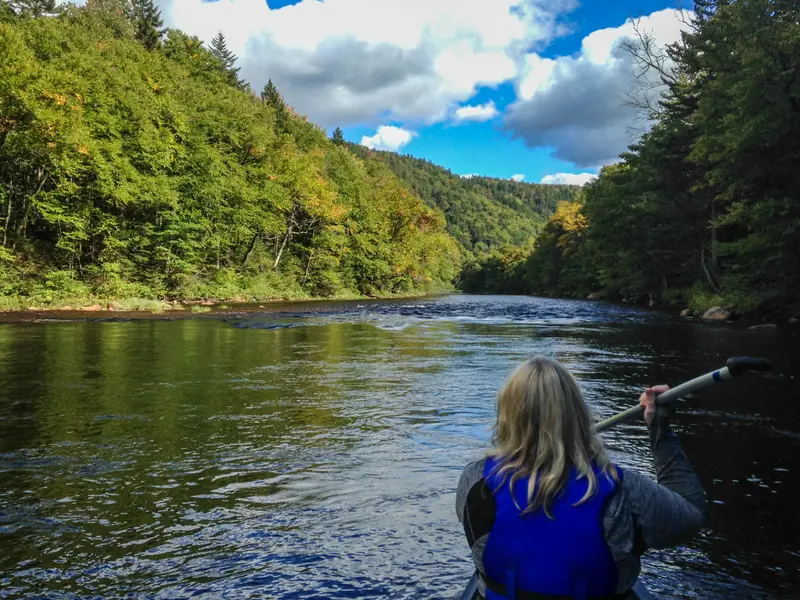
Our friends, in their happy, upright canoes, had left us far behind long ago, and it felt like Jeff and I were totally, miserably, inconsolably alone.
Because we were.
We were alone, together. We needed help, but didn’t know how to get it or who to ask. There was no one left. Something that was supposed to be fun had stopped being fun long ago, and yet here we were in this dreaded canoe, blindly paddling in circles and just wishing that it could somehow all be over.
Jeff and I never got in another canoe together after that. In fact, it would be many years before I would attempt to get in another canoe again with anyone, period. Even after getting sober, you can probably imagine why I was understandably reluctant to bring anything whatsoever of value with me. In my mind, anything you bring with you into a canoe better be expendable and of little worth. It’s probably going to end up deep below the surface, in a dark, watery grave.
Abandoning all metaphor here and speaking quite literally, the very first time I decided to canoe again, sober— I kid you not— my canoe had a hole in it. No one else’s, just mine. Unbelievable. It filled up with water, overturned me and my buddy into Lake Powell, and once again I was back in the water fully clothed. I tried not to read too much into this and was just grateful I’d had the sense to bring absolutely nothing with me this time around. No wallet, no keys, no phone… and certainly no whiskey.
This was a bit of a wakeup call and it let me know that just because I’d stopped drinking, all my problems weren’t just going to magically get solved, all in one fell swoop. I was still going to have to learn how to steer the canoe, make smart decisions, and deal with irritating problems as they unexpectedly gurgled up.
I have since canoed and kayaked many, many, times (with no further altercations of note), and as you can see from the photo I took of the dreadlocked canoer in Nepal, I have even gotten comfortable bringing my camera equipment with me once again. I’m shooting from a different canoe several yards away, very much sober and very much upright, dry, and in control of my own destiny. No more circles.
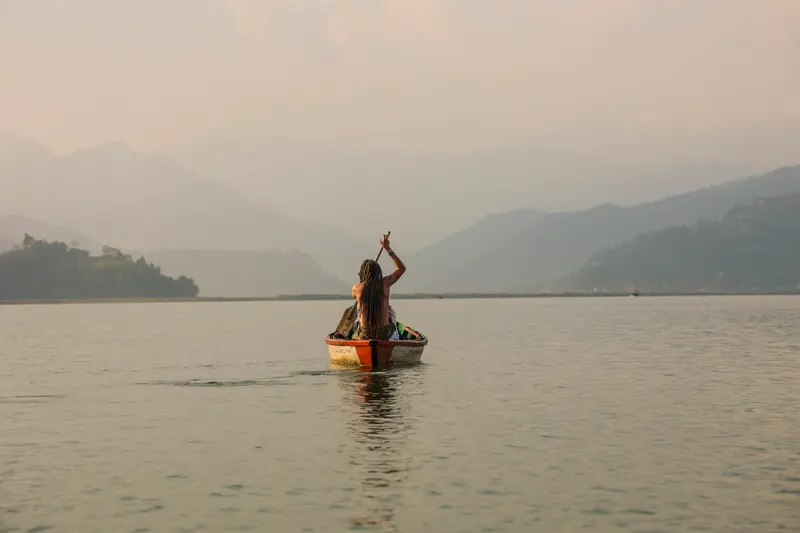
The guy paddling the canoe has awesome dread locks down to his waist, that much is true. But by now I’m sure you’ve come to realize that the dreaded canoe I was referring to in my title…was always my own.
Canoeing gets a solid Sober Fun rating from me of 8. And let me just say this— before you get nervous, and fearful that my entire list of activities is just going to be thinly veiled allegories for relationships, fear not! This was an exception. For example, HERE, my horse is just a horse.
But I will say one final thing about canoeing (and you can choose whether to read it as a double entendres or at face value, as both interpretations are equally true and relevant), and my advice is this:
Before you decide to involve another person and take them with you in your canoe, why don’t you first make sure you are capable and competent of going it alone?
I’ll put it this way: would YOU want to get in a canoe with you? If the answer is no, that’s okay! It just means maybe you have a bit of solo work to do, before you start involving other people, and asking them to come with you on your journey. Figure out where you are headed and where you ultimately want to end up, and that will make finding the right person to join you so much easier.
The canoe, going around and around in circles, like we talked about earlier? Yeah. That’s the result of two people who don’t know what they’re doing or where they’re going, but with one commonality between them: They want to go in a different direction than the person who they are currently with.
************************************
If you'd like to see and read more, I struggle with the limitations of drug vocabulary HERE, I go to rehab HERE, and eventually, I write a List of Activities and their Sober Fun Ratings HERE.